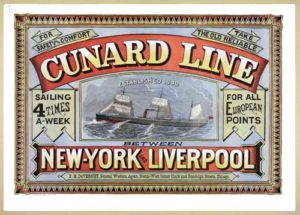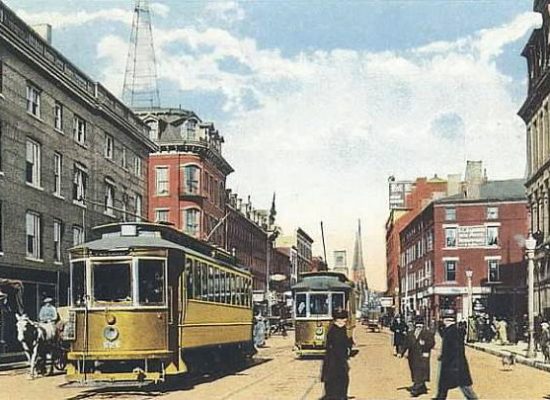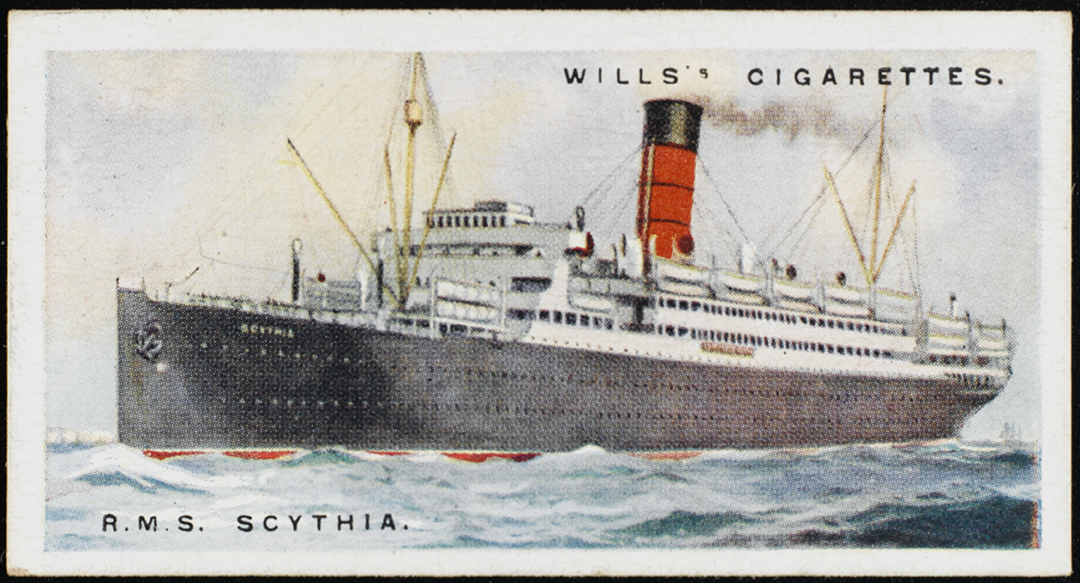
In the late 16th century, it became quite fashionable for young aristocratic men to travel abroad to France and Italy to complete their classical education. There they studied literature, art and architecture in such cities as Paris, Florence, Venice and especially Rome, giving birth to what would become known as the Grand Tour. By the late 19th century when steamship and train modes made travel somewhat less arduous, chaperoned young women of means were also embarking on Grand Tours of Europe.
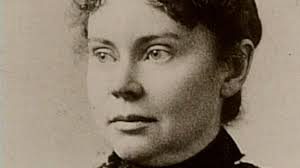 Lizzie Borden was no exception, and in July of 1890, Lizzie sailed on the Cunard Line’s steamship RMS Scythia from Boston to Liverpool, England to begin her 19 week Grand Tour. Lizzie was joined by four young ladies from wealthy Fall River families, as well as a female chaperone, a Fall River high school teacher. The girls were all unmarried, living with their parents and ranging in age from 25-32. Lizzie would celebrate her 30th birthday during her travel abroad, the tour itself likely being a birthday gift, along with a fashionable seal skin cape, gifted by her father Andrew Jackson Borden. As was custom of the time prior to photography, a passport contained physical descriptions of its holder, Lizzie’s describing her as having a full face, gray eyes and light brown hair. It also described her as having a pointed chin, a medium forehead and mouth, as well as a straight nose. Her height was listed as a diminutive 5’3” and her age as 29 years, 11 months.
Lizzie Borden was no exception, and in July of 1890, Lizzie sailed on the Cunard Line’s steamship RMS Scythia from Boston to Liverpool, England to begin her 19 week Grand Tour. Lizzie was joined by four young ladies from wealthy Fall River families, as well as a female chaperone, a Fall River high school teacher. The girls were all unmarried, living with their parents and ranging in age from 25-32. Lizzie would celebrate her 30th birthday during her travel abroad, the tour itself likely being a birthday gift, along with a fashionable seal skin cape, gifted by her father Andrew Jackson Borden. As was custom of the time prior to photography, a passport contained physical descriptions of its holder, Lizzie’s describing her as having a full face, gray eyes and light brown hair. It also described her as having a pointed chin, a medium forehead and mouth, as well as a straight nose. Her height was listed as a diminutive 5’3” and her age as 29 years, 11 months.
 According to the Fall River Historical Society’s tome Parallel Lives, Lizzie likely met her travel companions through her church, the Central Congregational, and through her work for church-related charities. Unlike many other parts of society of its day, church was a place where members of different social classes mingled superficially. Although Lizzie was traveling with two fellow Bordens (Anna and Carrie) who shared a common great-great grandfather with her, Lizzie was not known to them outside of church activities. At Lizzie’s trial nearly three years later, Anna, who shared a cabin with Lizzie on their return journey, testified that she was not a relative of Lizzie’s. Anna went on to testify that during conversations that she had with her while on the ship, Lizzie regretted returning home after such an enjoyable trip because her home was such an unhappy one.
According to the Fall River Historical Society’s tome Parallel Lives, Lizzie likely met her travel companions through her church, the Central Congregational, and through her work for church-related charities. Unlike many other parts of society of its day, church was a place where members of different social classes mingled superficially. Although Lizzie was traveling with two fellow Bordens (Anna and Carrie) who shared a common great-great grandfather with her, Lizzie was not known to them outside of church activities. At Lizzie’s trial nearly three years later, Anna, who shared a cabin with Lizzie on their return journey, testified that she was not a relative of Lizzie’s. Anna went on to testify that during conversations that she had with her while on the ship, Lizzie regretted returning home after such an enjoyable trip because her home was such an unhappy one.
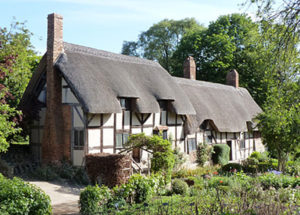 By all accounts the Grand Tour was indeed a happy time for Lizzie. Traveling first class with wealthy companions likely gave Lizzie her first taste of what it was like to be a member of high society. Lizzie collected more than 168 photographs of various sites throughout her travel, and after her return in November 1890, she painstakingly collected them into two large albums. She included quotes from famous authors such as Byron, Shakespeare, Twain and Hawthorne as well as information from travel guides she had brought on her trip, which she neatly hand wrote above and below the photographs. Lizzie proudly shared these albums when she spoke of her trip, particularly the British Isles.
By all accounts the Grand Tour was indeed a happy time for Lizzie. Traveling first class with wealthy companions likely gave Lizzie her first taste of what it was like to be a member of high society. Lizzie collected more than 168 photographs of various sites throughout her travel, and after her return in November 1890, she painstakingly collected them into two large albums. She included quotes from famous authors such as Byron, Shakespeare, Twain and Hawthorne as well as information from travel guides she had brought on her trip, which she neatly hand wrote above and below the photographs. Lizzie proudly shared these albums when she spoke of her trip, particularly the British Isles.
 Although the exact itinerary is unknown, Lizzie’s albums indicate she first traveled to Ireland, seeing such sites as the Blarney Castle and then she visited Scotland with its magnificent lochs and Highlands castles. She had an affinity for Scotland in particular, and in future years would name her beloved Boston terriers with Scottish names such as Donald Stewart, Royal Nelson and Laddie Miller. “My Ain Countrie,” a Scottish hymn from a temperance songbook was sung at her funeral and words from it are carved into Maplecroft’s second floor library mantelpiece.
Although the exact itinerary is unknown, Lizzie’s albums indicate she first traveled to Ireland, seeing such sites as the Blarney Castle and then she visited Scotland with its magnificent lochs and Highlands castles. She had an affinity for Scotland in particular, and in future years would name her beloved Boston terriers with Scottish names such as Donald Stewart, Royal Nelson and Laddie Miller. “My Ain Countrie,” a Scottish hymn from a temperance songbook was sung at her funeral and words from it are carved into Maplecroft’s second floor library mantelpiece.
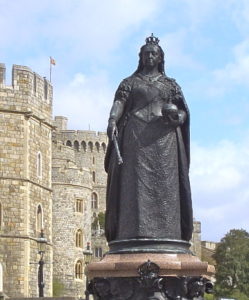 Lizzie traveled extensively throughout England, including the Lake District, Oxford and Windsor Castle, likely viewing the statue of Queen Victoria erected for her Jubilee only a few years earlier. Anyone who prefers the image of Lizzie as one of the infamous murderers of the Victorian Age should note that in 1890, England was still reeling from the Jack the Ripper serial murders that occurred just two years earlier.
Lizzie traveled extensively throughout England, including the Lake District, Oxford and Windsor Castle, likely viewing the statue of Queen Victoria erected for her Jubilee only a few years earlier. Anyone who prefers the image of Lizzie as one of the infamous murderers of the Victorian Age should note that in 1890, England was still reeling from the Jack the Ripper serial murders that occurred just two years earlier.
Lizzie also visited The Netherlands, Germany and Switzerland, including such sites as the Statue of Bavaria in Munich and the Clock Tower in Bern. In Italy Lizzie visited art galleries in Florence, the Milan Cathedral and took a gondola down the Grand Canal in Venice. She bought most of her photos in Italy, many of them reproductions of the great works of art she undoubtedly viewed in the galleries and cathedrals. In Rome she viewed such sites as St. Peter’s Basilica and the Coliseum, and in France she traveled to Nice and then on to Monte Carlo. In Paris she went to the Louvre and Notre Dame, among other great sites. Lizzie spent nearly five months traveling through places of great beauty and history, viewing classic art and architecture, and all with first class accommodations.
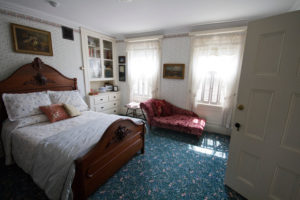 Traveling first class with wealthy companions may have given Lizzie her first taste of what it was like to be a member of high society, but she did need to request additional funds be wired by her father while away on the trip. The trip itself, a possible 30th birthday gift, or perhaps a way to appease Lizzie by offering something equal to her after Emma was sent to the prestigious Wheaton Female Seminary. Either way, shortly after Lizzie’s return, she would inexplicably switch bedrooms with her sister Emma, taking the much larger, sunnier room while older sister Emma took the cramped, darker adjoining room, that had formerly been Lizzie’s. The sisters would remain in these rooms up until the hatchet murders of their father Andrew and step-mother Abby Borden, less than two years later.
Traveling first class with wealthy companions may have given Lizzie her first taste of what it was like to be a member of high society, but she did need to request additional funds be wired by her father while away on the trip. The trip itself, a possible 30th birthday gift, or perhaps a way to appease Lizzie by offering something equal to her after Emma was sent to the prestigious Wheaton Female Seminary. Either way, shortly after Lizzie’s return, she would inexplicably switch bedrooms with her sister Emma, taking the much larger, sunnier room while older sister Emma took the cramped, darker adjoining room, that had formerly been Lizzie’s. The sisters would remain in these rooms up until the hatchet murders of their father Andrew and step-mother Abby Borden, less than two years later.
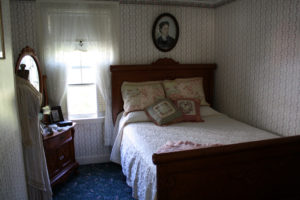 Although Lizzie was arrested for the crimes, she was subsequently acquitted and she and her sister then purchased Maplecroft, a large and stately home in a wealthier part of Fall River, after inheriting their father’s fortune. Although Lizzie would travel later in life, there is no evidence that she ever again traveled to Europe.
Although Lizzie was arrested for the crimes, she was subsequently acquitted and she and her sister then purchased Maplecroft, a large and stately home in a wealthier part of Fall River, after inheriting their father’s fortune. Although Lizzie would travel later in life, there is no evidence that she ever again traveled to Europe.
The impact of the European Grand Tour on Lizzie’s imagination and sensibilities can only be guessed at, but if the crafted care that she put into the composition of her scrapbooks is any indication, she was mesmerized and possibly transformed as a person. Her return to a life of church service, domestic tasks and spinsterhood with only her scrapbooks to remind her of an elegant and romantic life beyond the sea may have changed the way she experienced her home life and the relatively provincial nature of her own Fall River.
Either way, she was about to go down in history in a way none of the Fall River debutantes on the steamship R.M.S. Scythia could have ever predicted about their mysterious cousin from below the Hill.
Happy Birthday Lizzie Borden! Born July 19, 1860.

